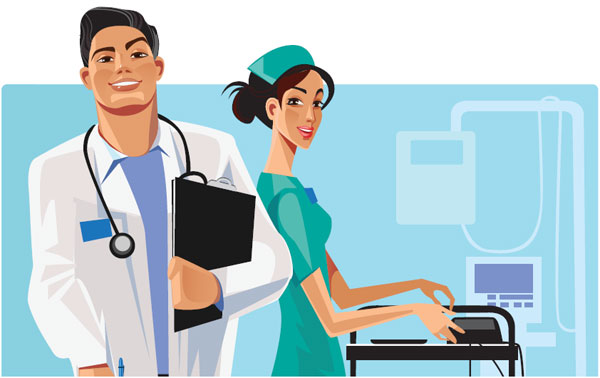Navigating the hospital labyrinth
Long lines and complex departments: Seeing a doctor in China is not easy
Millions have been there: The labyrinth that is Chinese healthcare. In truth, it is a marvel of logistics, but that is not the impression you get when you encounter hospital bureaucracy.
You arrive at 8 am to find a long, snaking line of seriously ill people and others who just want a checkup. An hour or more passes, and it's your turn to register - to enter the maze. Which department do you want? Do you have a hospital card? Did you bring your medical records?

Registration
First, decide whether you want to visit the general outpatient department (门诊部 ménzhěnbù) or the emergency department (急诊部 jízhěnbù). Obviously, the registration process for emergencies is faster.
If it's not an emergency, you'll find yourself in outpatients, where you can always count on an incredibly long line, so remember to get up early. There is the option of registering over the phone or online in advance, but this won't save you from the lines.
When you arrive at the hospital, the information desk (导医台 dǎoyītái) should be able to tell you where to register.
Patient: Excuse me, which department should I go to?
Qǐngwèn wǒ yīnggāi guà shénme kē?
请问我应该挂什么科?
Staff member: Well, where does it hurt?
Nǐ nǎlǐ bú shūfu?
你哪里不舒服?
Patient: I'm dizzy, have a cough, and perhaps a fever.
Wǒ tóuyūn, késòu, kěnéng hái fāshāo.
我头晕,咳嗽,可能还发烧。
Staff member: You should go to the respiratory department. Have you brought your medical records?
Nǐ yīnggāi guà hūxī kē. Nǐ dài bìnglì le ma?
你应该挂呼吸科。你带病历了吗?
Patient: No, I don't think so.
Méi dài.
没带。
Staff member: Then please get a new one at the registration office.
Qǐng zài guàhàochù mǎi běn xīn de ba.
请在挂号处买本新的吧。
Now, you are on your way to being treated, but registration offers yet another hurdle, when the nurse says:
What kind of registration do you want?
Nǐ yào guà shénme hào?
你要挂什么号?
Relax, the nurse is just asking if you want the general outpatient service (普通号 pǔtōnghào), the expert service (专家号 zhuānjiāhào) or the service for specialized diseases (特需门诊号 tèxū ménzhěnhào).
Registration fees change accordingly, starting at 3 to 5 yuan, and up to more than 10 yuan. The general service can deal with any run-of-the-mill illness. Worst-case scenario, they send you to a specialized department.
What's up, doc?
You're registered, and now you have a medical record and a number. Go to the waiting room just outside the consultation room. After more waiting your number will eventually appear on a screen, and then you head to the consultation room only to find a crowd of people around the doctor.
It's not uncommon for patients and their families to keep asking questions long after a consultation is over. So you need to get the doctor's attention. If you succeed, have a seat, but don't get comfortable. Someone is likely to burst through the door at any time with his or her examination results.
After your examination, if the doctor prescribes medicine, all you need to do is to pay the cashier and head to the pharmacy.
Doctor: I think you need an intravenous drip.
Wǒ rènwéi nǐ xūyào dǎ diǎndī.
我认为你需要打点滴。
Patient: Really? Is that necessary?
Zhēn de ma? Bìxū dǎ ma?
真的吗?必须打吗?
Doctor: It will help you recover faster.
Dǎ diǎndī dehuà, nǐ huì huīfù de kuài yīdiǎnr.
打点滴的话,你会恢复得快一点儿。
Be warned: Some Chinese doctors have a tendency to over-prescribe pills, powders, antibiotics, injections and traditional medicine.
Patient: I hate injections. Is it OK if I just take medicine?
Wǒ tǎoyàn dǎzhēn, zhǐ chī yào kěyǐ ma?
我讨厌打针,只吃药可以吗?
Doctor: Sure ... If you insist.
èn ... jìrán nǐ jiānchí dehuà, nà hǎo ba.
嗯......既然你坚持的话,那好吧。
If your condition is not simple, the doctor will write a slip for more tests (remember to pay first). The bad news is you may have to come back another day to do them.
When you eventually get the results and head back to see the doctor, if you're lucky, he or she will give you a prescription. If the results are inconclusive, you may need even more tests.
Doctor: Your results are inconclusive.
Nǐ de jiǎnchá jiéguǒ hái bù míngquè.
你的检查结果还不明确。
Patient: Oh no.
Bú shì ba!
不是吧!
Doctor: You'll need to come back on another day for blood tests.
Guò liǎng tiān zài lái yàn yíxià xiě ba.
过两天再来验一下血吧。
Worst-case scenario, you may need to be hospitalized.
Doctor: We need to keep you for observation.
Nǐ de bìngqíng xūyào zhùyuàn guānchá.
你的病情需要住院观察。
The payment method for the inpatient department (住院部 zhùyuànbù) is different. You need to prepay a certain amount, potentially thousands of yuan. All expenses incurred will be deducted from your prepayment. You'll get another doctor, and different tests, and, hopefully, get well.
If not ... Well, going to the doctor means there's something wrong, and if it's serious you may hear your doctor say:
Did anyone come with you?
Yǒu rén péi nǐ yìqǐ lái ma?
有人陪你一起来吗?
Or they may say:
Would you like me to talk with your family?
Xūyào wǒ gēn nǐ de jiārén tányitán ma?
需要我跟你的家人谈一谈吗?
If you hear your doctor say this, you may want to brace yourself for bad news. Hopefully, you won't, and you'll soon make it out of your Chinese hospital nightmare.
No country has healthcare totally figured out, but in China it can be cheap and efficient if you know how to work the system. The best way to make sure you don't have to deal with all this is to remember to take care of your health.
But also remember that no one stays well forever, so be prepared.
Courtesy of The World of Chinese, www.theworldofchinese.com
The World of Chinese


















